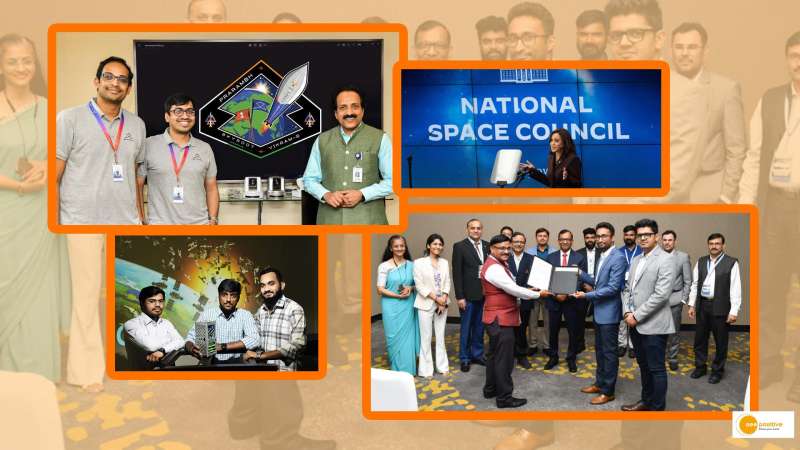

The Indian space tech ecosystem had a historic year in 2022, with the country recording its first private rocket launch and multiple other satellite launches by private players, capturing not only the attention of the subcontinent but also the attention of the rest of the world.
The industry anticipates riding this momentum into 2023, with around $300 million in private capital investment, multiple orbital launches of rockets other than satellites, and the implementation of the new India Space Policy, which will further open up the ecosystem.
The year that was
Overall, 2022 was a watershed moment for the space tech ecosystem, with the launch of the first Indian-made satellites authorised by IN-SPACe and Agnikul Cosmos establishing the first privately-owned rocket launchpad.
According to Lt Gen AK Bhatt (retd), director general of the Indian Space Association, the industry will witness some major milestones in 2022, beginning with NewSpace India Limited (NSIL), the commercial arm of the Indian Space Research Organisation (ISRO), authorising the space conglomerate formed by Larsen and Toubro and HAL to develop 5 Polar Satellite Launch Vehicles (PSLVs) (ISpA).
OneWeb also signed a pact with NSIL to launch low-Earth orbit satellites from India, as well as the first satellite broadband licence contract with the Department of Telecommunications.
Skyroot Aerospace: Skyroot Aerospace, a Hyderabad-based space tech startup, made history this year when it launched its rocket Vikram-S into space, becoming the first private company to do so. GIC also contributed $51 million to the startup.
Dhruva Space: Similarly, Dhruva Space, a Hyderabad-based startup, qualified their satellite orbital deployer on PSLV C53 in June before launching their two Thybolt satellites on PSLV C54 in November.
Digantara: Bengaluru-based Digantara launched the smallest and first commercial space weather sensors into low earth orbit, according to the company’s CEO, Anirudh Sharma.
The company is also working on a space situational awareness (SSA) architecture, which is used to track objects in orbit and predict where they will be at any given time.
According to Sharma, the startup announced the establishment of its ground-based SSA observatory in 2022.
Similarly, SpaceFields has been working on its three solid-stage rocket engines.
Furthermore, Pixxel, a Bengaluru-based space tech startup, launched three hyperspectral satellites, including the most recent Anand satellite, aboard an ISRO rocket in November 2022.
What the industry plans to do in 2023
Multiple launches are planned for 2023 by Indian space tech startups, with many intending to begin commercial operations. Skyroot, for example, plans to launch its Vikram-1 launch vehicle into orbit. The Vikram-S launch earlier this year was a sub-orbital launch, which means the rocket flew below the Earth’s orbit. SpaceFields, based in Bengaluru, plans to test three solid rocket engines that have been in development.
Dhruva Space, which launched two nanosatellites, is planning to launch a higher class of satellites in 2023.
According to Chaitanya Dora Surapureddy, the company’s chief financial officer, the company has already received its first commercial contract worth Rs 20 crore to build satellites.
Previously, Pixxel co-founder Kshitij Khandelwal told Moneycontrol that the company’s goal is to have its hyperspectral satellite constellation ready for launch by October 2023. The company’s commercial operations would also begin at this time.
Similarly, Agnikul Cosmos intends to launch their rocket Agnibaan at full scale in March/April 2023. Bellatrix Aerospace, based in Bengaluru, also intends to test its propulsion technologies — systems that guide satellites to their destination — in space by 2023.
What lies ahead for the industry
First, the industry is anticipating the announcement of the new India Space Policy in 2023, followed by the Space Activity Bill.
Space Policy:
“The new ‘Indian Space Policy,’ followed by the Space Activity Bill, will be a complete game changer, covering upstream and downstream activities and assisting in the formulation of a vision to strengthen the investment climate in the private space sector,” ISpA’s Bhatt said.
However, as the country waits for the Space Act and the India Space Policy, the industry anticipates massive demand for satellites in the coming years, boosting growth in satellite-enabled services.
G20:
The Indian space tech industry anticipates a significant boost to the ecosystem as India assumes the G20 presidency this year.
“India’s assumption of the G20 Presidency for a year is a boon. The emphasis on climate finance, disaster response, and startups will have a significant impact on the space-based solutions that India can provide to improve the lives of people on Earth,” said Dhruva Space founder Sanjay Nekkanti.
PLI scheme:
ISpA’s Bhatt also requested that the government implement a PLI for satellite production in 2023. “This will help boost the private space ecosystem and encourage new startups,” Bhatt said.
More funding:
Pawan Kumar Chandana of Skyroot Aerospace anticipates a capital infusion of more than $300 million. India currently has over 100 space startups that have raised over $245.35 million in funding.


